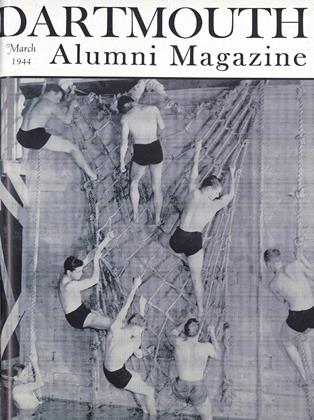HASKINS COLLECTION POSSESSES BOTH HISTORICAL AND PRACTICAL VALUE
AN EXCELLENT COLLECTION of builders' . and cabinet makers' tools owned by the late Dr. Charles N. Haskins, Chandler Professor of Mathematics at Dartmouth, has been given to the Student Workshop through the generosity of Mrs. Haskins.
The gift includes tools collected and used by the father and grandfather of Professor Haskins, both of whom were professional builders and cabinet makers. Represented are all types of hand tools, some of the earliest of which were made in England and Germany. Two English wood bit braces with brass inlay work are representative of this group. Early New England buildings with log frames, using mortise and tenon construction, required heavy tools, such as the chisels three inches wide and 30 inches long which are in the collection. Interior finish and cabinet work required special tools such as molding planes and carving chisels; and more than 75 wood molding planes are included in the group.
My visit to the workshop where Professor Haskins kept the tools and where he worked was an interesting experience. I had heard a great deal about Dr. Haskins as a mathematician and as a professor, but I had never met him and had no good picture of him as a man. After two hours in the shop I think I knew Mr. Haskins even better than some who had sat in his classes. The entire shop was a picture of neatness and order. Cupboards lined the walls with tools all properly arranged. Shelves were lined with carefully labeled rows of boxes and cans filled with screws, bolts, and spare parts. These tools had no doubt been one of Mr. Haskins' greatest sources of recreation. Toolchests, with careful arrangement of tools, were mounted on casters and rolled under the work bench in special places. A faucet had been equipped with a long handle which made it easier to operate. A chain hoists and track had been arranged to make the lifting of heavy objects easier. It occurred to me that these tools had done more than help the manthey had actually become a part of his life in the pleasure and inspiration they had been to him.
Needless to say, Professor Haskins had taken the best possible care of all the tools. Consequently, even the oldest are still in excellent condition. They are clean, free from rust, sharp enough for immediate use, and carefully placed in chests and cupboards where they will not be dulled by hitting other tools. Dr. Haskins had also added a great many modern tools such as steel planes, brace bits, saws, etc.
The practical value of the gift should not be overlooked. The Student Workshop needs more tools so that it can accommodate more students, and this helps supply the need. A point worth mentioning here is that, in my opinion, old hand tools, though less streamlined than modern tools, are often just as useful as the latest designs. Modern combination planes, for instance, will do the work of a hundred wood molding planes, but they will do it no better. Almost every tool in the collection can, and will, be used in the Student Workshop.
The importance from a historical viewpoint is probably greater than the practical value. One of my early requests, in connection with the Student Workshop, was that we be permitted to make a collection which would show the development of tools and their relationship to design in architecture and furniture in New England. The Haskins tools make an excellent start toward such a collection.
Good tools sometimes help in the shaping of good objects; they also, sometimes, help in the shaping of good minds. I sincerely hope that many Dartmouth students will profit by handling and using these tools.
CENTURY-OLD TOOLS given to the College by Mrs. Charles N. Haskins are examined in the Student Workshop by two of the shop's devotees, A/S George Kelley USNR, of South Yarmouth, Mass., and Marine Pvt. Hugh Morris '45 of Washington, son of George Morris '11.
Workshop Director
 View Full Issue
View Full Issue
More From This Issue
-
 Article
ArticleTEACHING NAVY TRAINEES
March 1944 By ARTHUR DEWING '25 -
 Sports
SportsWith Big Green Teams
March 1944 By Dick Gilman '45 -
 Class Notes
Class Notes1918
March 1944 By ERNEST H. EARLEY, DONALD L. BARR -
 Class Notes
Class Notes1931
March 1944 By CHARLES S. MCALLISTER, WILLIAM A. GEIGER -
 Lettter from the Editor
Lettter from the Editor'Round the Girdled Earth
March 1944 -
 Article
ArticleARTHUR FAIRBANKS '86
March 1944 By DR. FREDERIC P. LORD '98
Virgil Poling
Article
-
 Article
ArticlePresident Hopkins Has A Stimulating Thought
NOVEMBER 1927 -
 Article
ArticleFaculty Additions
November 1935 -
 Article
ArticleDefense Electives
November 1941 -
 Article
Article$150,000 TO MEDICAL SCHOOL
APRIL 1964 -
 Article
ArticleBirds of a Feather
Mar/Apr 2010 By Karen Iorio ’10 -
 Article
ArticleThayer School
October 1945 By William P. Kimbill '29.



